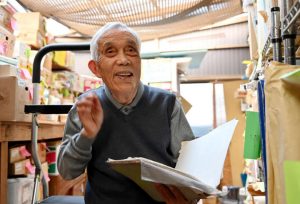My Life — Interview with Hiromu Morishita (1930–), A-bomb survivor and teacher, Part 15: Record of the A-bombed city
May 10, 2022
Aiming to pass on A-bomb experience to future generations
by Michiko Tanaka, Senior Staff Writer
Even after turning 80, I have continued to talk about my experience in the atomic bombing to school students on school excursions, in my own low-key way. Even during the COVID-19 pandemic, I provided online lectures and the like when requested. As for the rest of my time, I have put a lot of effort into sorting my documents and materials.
Hiromu Morishita has at his home tens of thousands of documents and materials related to peace activities. Specialists pay attention to many of them, considering them “extremely valuable.”
When I was a university student, a tutor told me to become a dedicated note-taker. According to that tutor, since there is a limit to human memory, we should all store records. That is why during the Hiroshima-Nagasaki World Peace Pilgrimage I continued to write down what happened and what I was feeling each day. I also took many photographs. I have held on to everything, including lists of participants, itineraries, reports I compiled after returning to Japan, and many other items. If there were no documents or materials that could convey the facts, there would be nothing I could say. I want to avoid a situation in which facts are assumed not to have existed because of a lack of documentary evidence.
However, partly because it’s hard for me to throw things away, the materials just keep piling up. Even after I added a room for storage, the entire house is full of materials, making my family wear resigned expressions on their faces. Last summer, I began a full-fledged effort to sort everything with the help of volunteers from the World Friendship Center. Soon, a day will come when there are no more A-bomb survivors like us. At that time, I want people to know about the atomic bombing through the materials. Once I’ve finished sorting everything, I will look for a public organization in Hiroshima that can accept all the documents and materials. I believe that is my job.
I want to continue communicating my message for as long as I can. I’m very glad that the Treaty on the Prohibition of Nuclear Weapons was established. However, there is still a long way to go until nuclear weapons are eliminated. To change the attitudes of nuclear weapons states and the Japanese government, we all have to do what we can based on each of our positions and capabilities. I will also continue to do what I can because I want young people to live their lives without being threatened by war or nuclear weapons.
All of this work is in preparation for the end of my life. Everyone’s life will eventually come to an end. Ever since I experienced the atomic bombing, I have devoted myself to peace activities, believing that was my mission as a survivor. I want to appreciate each day in the future, too. I want to always be kind to the people around me, starting with my wife. That is what I think.
(Originally published on May 10, 2022)








